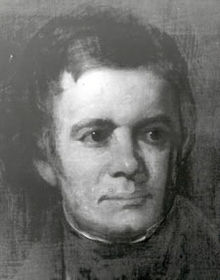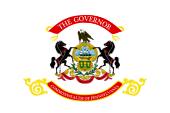- David R. Porter
-
David Rittenhouse Porter 
9th Governor of Pennsylvania In office
January 15, 1839 – January 21, 1845Preceded by Joseph Ritner Succeeded by Francis R. Shunk Personal details Born October 31, 1788
Norristown, PennsylvaniaDied August 6, 1867 (aged 78) Political party Democratic David Rittenhouse Porter (October 31, 1788 – August 6, 1867) was the ninth Governor of Pennsylvania. He served from 1839 to 1845.
Life
Porter, the first governor under the State Constitution of 1838 was born October 31, 1788, near Norristown, Montgomery County, Pennsylvania spending his boyhood at Selma Mansion, a home built by his father in 1794.
David R. Porter was the son of Andrew and Elizabeth (Parker) Porter. Andrew Porter distinguished himself in battle as a Revolutionary soldier, later became the state's surveyor general, but turned down an appointment by President Madison to become secretary of war.
Porter received a classical education at Norristown Academy. In 1813, he moved to Huntingdon where he studied law with Edward Shippen and eventually purchased an iron works. Due to the recession that followed the War of 1812 and his resulting business failure his life was changed by 1819. He turned to politics, being elected to the General Assembly, and married Josephine McDermott in 1820.
He also served in row offices in Huntingdon County and then was elected to the Pennsylvania Senate in 1836. In 1838 Porter was nominated for governor by the Jacksonian Democrats in order to mend the split between former Governor George Wolf and the Rev. Henry A. Muhlenberg, as well as defeat incumbent Governor Joseph Ritner's bid for a second term.
By then the public had grown tired of the Anti-Masonic Party's "witch hunts," giving Porter a slim 5,500-voter margin of victory. The election result was bitterly contested by Ritner's supporters nearly to the point of violence. Known as the "Buckshot War," Governor Ritner was forced to order militia intervention in Harrisburg for the peaceful transition of government. Porter's victory was certified by the legislature only a few days before his inauguration.
Upon taking office, Porter was immediately challenged with heavy state spending, coupled with a recession that began in 1837. Affable, eloquent, but succinct in expression, his statements often moralized against the improvident profusion in spending. He obtained a tax on persons in professions and the trades that was much like an income tax, and the first tax on capital stock shares. He cut state spending and hiring, although his administration continued the work on the expansion of canals and railroads.
The governor also promoted the economic benefits of connecting canals and railroads between Pittsburgh and points west to the capitals of Ohio, Indiana, and Illinois, and to the Mississippi River at St. Louis. Although the total state debt rose twenty-five percent under Porter, the state eventually had more than enough revenue to pay the interest.
Porter resisted attempts of the General Assembly to encroach upon constitutional separations of the executive and judicial branches and refused to recognize some demands of the legislature. Porter easily won re-election in 1841 over John Banks, the first Whig gubernatorial candidate to run without a coalition with the Anti-Masonic Party.
During his second term, the imprisonment of people for debts was abolished, but he faced difficult decisions with a rise of anti-foreign prejudice. During "Nativist riots" in Philadelphia in 1844, mainly directed toward Irish Catholic immigrants, Governor Porter acted firmly to suppress violence.
The new state constitution no longer allowed a third term as governor and acrimony with the assembly-including attempts to impeach him- and his own party's position against protective tariffs, which Porter favored, caused the governor to retire from politics.
After 1844, he resumed his private business in iron making, returning to public life only briefly in 1856 to endorse his longtime friend James Buchanan for president.
Porter became involved in promoting a transcontinental railroad through Texas and adapting anthracite coal to iron making. He built the first anthracite coal furnace for iron in south central Pennsylvania at Harrisburg.
Speaking out against Southern secession from the Union, he lived long enough to see his son, Lt. Col. Horace Porter, later a general, gain honor through many Civil War battles. As the aide-de-camp for General Grant, Horace Porter was present to witness the surrender of General Lee. It is said that Horace Porter’s book on the subject was the definitive account of the events at Appomatix Court House.
David R. Porter died August 6, 1867, at age seventy-eight, from a long illness contracted the previous winter after attending a night church meeting in Harrisburg. He is buried in Harrisburg Cemetery.
External links
Political offices Preceded by
Joseph RitnerGovernor of Pennsylvania
1839–1845Succeeded by
Francis Rawn ShunkGovernors, Lieutenant Governors, Presidents and Vice-Presidents of Pennsylvania Governor 
Presidents
(1777–1790)Governors
(since 1790)Mifflin · McKean · Snyder · Findlay · Hiester · Shulze · Wolf · Ritner · Porter · Shunk · Johnston · Bigler · Pollock · Packer · Curtin · Geary · Hartranft · Hoyt · Pattison · Beaver · Pattison · Hastings · Stone · Pennypacker · Stuart · Tener · Brumbaugh · Sproul · Pinchot · Fisher · Pinchot · Earle · James · Martin · Bell · Duff · Fine · Leader · Lawrence · Scranton · Shafer · Shapp · Thornburgh · Casey · Ridge · Schweiker · Rendell · CorbettLieutenant Governors 
Vice-Presidents
(1777–1790)Lieutenants Governors
(since 1875)Categories:- 1788 births
- 1867 deaths
- Governors of Pennsylvania
- Pennsylvania State Senators
- Porter family
Wikimedia Foundation. 2010.
